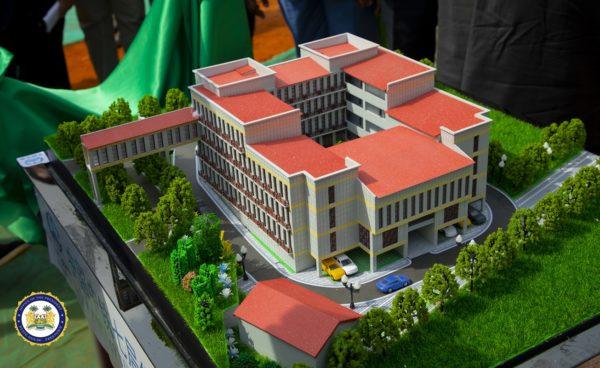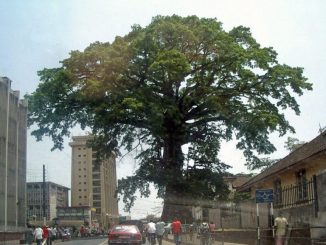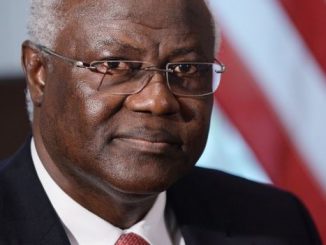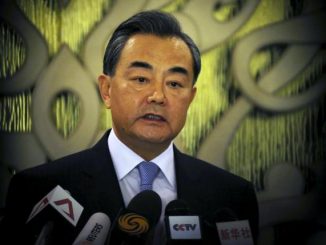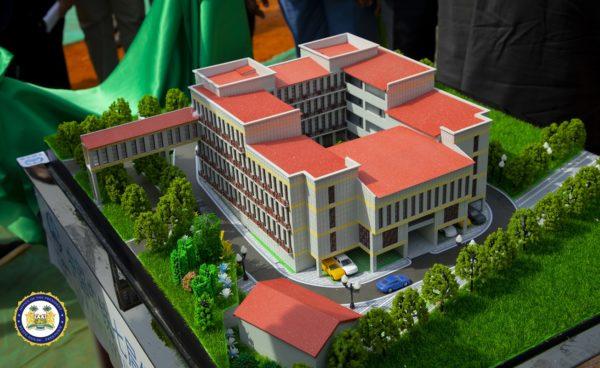
Does Sierra Leone need a foreign service academy costing millions of dollars?
Is this just another white elephant to boost the ego of Sierra Leone’s political leaders?
Millions of young people are leaving school and college without an occupational skill, due to the lack of vocational skills training colleges in the country. Hence the construction of a foreign service academy at this time of Sierra Leone’s economic cycle is raising eyebrows.
Last Monday, President Julius Maada Bio turned the sod for the construction of a multi-million dollar Foreign Service Academy on land adjacent to the Ministry of Foreign Affairs and International Cooperation in Freetown.
Deputy Director-General of Overseas Company of the China Railway Seventh Group (CRSG) – Dong Xinagyang, said he is honoured to have been awarded the contract for the construction of the Service Academy, which he said when completed will become the 17th infrastructural development his company has undertaken in Sierra Leone.
He assured that CRSG would deliver the building on time and that quality will be paramount throughout the construction phase.
“This is another news waiting to happen because the construction of the Foreign Service Academy will create more jobs and skills training to deserving Sierra Leoneans,” he said.
But should president Bio have asked the Chinese to build a farming and food processing academy, or a building construction academy instead of a foreign service academy, to meet the needs of the millions of young people that are in Sierra Leone without a vocational skill?
China’s Ambassador to Sierra Leone – Hu Zhangliang, said that it is a great pleasure to be witnessing the turning of the sod for the construction of a Chinese financed Foreign Service Academy, saying that it is a fulfilment of Sierra Leone’s long and friendly relations with China.
“China and Sierra Leone have come a long way in friendship and bilateralism. China is committed to advancing international cooperation in the infrastructural development of Sierra Leone,” he assured.
Ambassador Hu also disclosed that the construction of the Foreign Service Academy is a Christmas gift to the country, adding that the two countries have always worked together to foster development in the West African nation.
Sierra Leone’s Minister of Foreign Affairs and International Cooperation, Nabeela Tunis, said that it is with profound happiness that she witnessed what she called “a historic event of launching the construction of Sierra Leone’s first-ever diplomatic academy”, which would provide the much-needed platform to share knowledge, skills and expertise.
“What we are witnessing here today is a product of intensive work geared towards mobilising the needed resources to translate the vision of His Excellency the President into tangible reality. I am, in that regard, pleased to formally announce today that the Government of the People’s Republic of China has provided the funds to assist us to establish the first-ever diplomatic academy in our beloved land that we love, Sierra Leone,” she explained.
In his statement, President Bio told Hu Zhangliang that his government and the people of Sierra Leone are grateful for the generous support the People’s Republic of China continues to provide through Direct AID and FOCAC funding.
So how does president Bio justify spending millions of dollars on a foreign Service academy in a country that cannot feed itself?
This is the president’s speech:
“Let me, from the outset, extend warm sentiments and fraternal season’s greetings to His Excellency, President Xi, his Government, and the great people of the People’s Republic of China. The people of Sierra Leone fully appreciate the contribution of the Government of the People’s Republic of China to our development as a nation. Be assured that our cordial relations and mutual cooperation for the last fifty years will continue to grow from strength to strength. We remain firmly committed to the One-China Policy and we will continue to deepen all areas of bilateral cooperation.
We will also maintain close solidarity and coordination on multilateral affairs. We are grateful for the generous support the People’s Republic of China continues to provide to our nation’s development through Direct AID and through FOCAC funding. Previous speakers have highlighted interventions including past and ongoing key infrastructural projects.
Based on our continued friendly relations, we anticipate even more strategic partnerships and interventions that will support our nation’s development. Let me also register my sincere appreciation to all former and present diplomatic staff present. You have served our nation with great commitment and we truly value your representation on your various foreign assignments.
In the New Direction Manifesto, we argued that Sierra Leone had not maximised benefits from international diplomacy, foreign relations, and international co-operation because there was no clear foreign policy orientation, and there was undue interference in the recruitment and performance of diplomats.
Sometimes, untrained and unqualified civil servants were recruited and were “trained” on the job. Also, persons of dubious character and integrity were appointed or recruited either because of their membership of the APC party or upon the recommendation of APC party operatives. Missions went without regular subventions because staff deployment was irrational and ill-considered. This was further compounded by our nation’s failure to pay contributions to international bodies and hence our failure to benefit from those organisations.
Sierra Leone did not also take advantage of trade and investment opportunities for all the foregoing reasons and more. Sierra Leone’s international image and credibility suffered as a consequence of all this and bad governance at home. So in our Medium Term National Development Plan, we set out fifteen strategic policy actions including, establishing a diplomatic academy for training and producing higher numbers of career diplomats, creating special schemes to encourage young graduates to become career diplomats, and upskilling and reskilling existing staff to ensure higher productivity and efficiency.
This training, in addition to the reorganisation, harmonisation, and rationalisation of our Foreign Ministry and foreign missions could enhance the quality of our representation and thus maximise the benefits of our foreign relations. This is against the backdrop of a “new robust foreign policy that clearly promotes international cooperation built on respect, mutual trust, and benefit” and one for which Sierra Leone proactively, constructively, and productively engages the world.
We are paying our contributions to international organisations and bringing our country into compliance. For instance, we have paid in full our contributions to the Commonwealth Secretariat, the International Criminal Court, and just last week, the World Trade Organisation.
With full participation, our country will realise the full benefits of development cooperation offered by those multilateral institutions. To achieve our strategic policy objectives as outlined in our Medium Term National Development Plan, the Sierra Leonean career diplomat who will be trained in this Foreign Service Academy for which we are breaking ground today should therefore have specific qualities.
First, the world is changing every day and the nature of diplomacy is forever changing. Diplomacy is no longer about just managing bilateral relations or just presenting political and other positions to other friendly nations or organisations. It goes beyond the traditional notion of acquiring and analysing deep knowledge about foreign nations, identifying key state actors, and successfully navigating relations with those nations through engagement and negotiations. It involves working with multilateral, multinational, and international organisations right across the globe. It involves negotiating partnerships and international instruments that foster the interests of our nation, promoting our trade and economic interests, and pursuing multilateral solutions to transnational issues ranging from trafficking in persons and irregular migration to terrorism, cybercrimes, illegal narcotics, trans-border insurgencies, climate change, pandemics, and more.
In fact, how we ascertain the nature, the reach, and the impact of these transnational phenomena and networks is central to the work of the new Sierra Leonean diplomat. Technology-mediated globalisation now means that the domestic and the international are one seamless continuum and the diplomat is therefore key in how the Government contends with those transnational issues. The work of diplomats also involves conflict prevention, crisis management, post-conflict reconstruction, and peacebuilding.
They have to navigate the complexities of competitive nationalisms, legitimacies, statehoods, and engage new and autonomous actors (in the private sector and multinational companies) and some non-state actors. The modern Sierra Leone diplomat should be able to understand and advise the government on the ramifications of development diplomacy for this country. They should also understand and coordinate our country’s new public diplomacy orientation toward economic diplomacy.
With the perceived depletion of development aid, there is a need to promote trade and investment. The large costs of establishing and operating an embassy must be offset with the trade and investment opportunities those diplomats in those missions can create for Sierra Leone. Also, COVID-19 has taught us that facility with information and communication technologies is an absolute necessity for the modern Sierra Leonean diplomat. Zoom meetings have been a common feature in diplomatic interactions.
But I would also like to see Sierra Leone project its voice on questions of developing common technical standards and architecture for using technology in diplomacy. I therefore see an opportunity for the Ministry of Foreign Affairs and International Cooperation to collaborate with the Directorate of Science, Technology, and Innovation on developing the infrastructure and training the modern Sierra Leonean diplomat on the integration of technology into the work of diplomacy.
I also see opportunities for collaboration with the Ministries of Basic and Senior Secondary School Education and Technical and Higher Education. From junior secondary school through University, young Sierra Leonean students should see diplomacy as a lifelong career – a career that is rich with possibilities. Information about the career and career pathways should be popularised among students.
I also see the new Sierra Leonean diplomat as being one who, at the very least, is proficient to fluent (in writing and speaking) in at least two of the UN languages – Arabic, Chinese, English, French, Russian, and Spanish. This, to my mind, must also be a strict requirement for every graduate.
For me also, the work of the future foreign service diplomat in a highly dynamic and complex global environment involves strong comprehension and exceptional critical thinking and research skills. He/she must have great cultural competence, exceptional interpersonal skills, outstanding communication skills, and should be nimble in order to competently and successfully navigate an increasingly complex and layered world. They should be inquisitive but flexible. They should be agile across tasks and they should be employable in various directorates of the Ministry without impact on their performance or fit.
Personally, I expect our modern diplomats to imbibe a gogetter mentality. But they should, at all times, temper that with irreproachable integrity and essential decency and never lose sight of the ethical implications of their actions. They must be persons of impeccable character and temperament whose judgements can always be trusted by all.
This is much about how we want to be represented as a country and how we want our diplomats to be seen by host nations and multilateral/multinational institutions as respectable and trustworthy partners. I also expect that the Ministry of Foreign Affairs and International Cooperation will develop entry requirements so that only our best and brightest can be admitted to and graduate from this academy.
As they transition into the world of work, I also expect that the Ministry will work with the Ministry of Planning and Development to develop comprehensive performance assessment and management indicators. To be, but more so, to remain a diplomat representing our great nation, our diplomats must satisfactorily pass all those annual performance indicators.
Let me reiterate by way of conclusion that what I expect from the Foreign Service Academy is a rigorous and comprehensive curriculum that trains the modern and future Sierra Leonean diplomat. We expect that graduates of the Foreign Service Academy will have a multiplier effect for the international standing and development of this country. They should protect the interests of our country and our citizens at all times by how they represent and negotiate on behalf of our country.
So let me, once more, thank our partners, the Government and People of the People’s Republic of China for their continued cooperation. I therefore formally turn the sod for the construction of Sierra Leone’s first ever Foreign Service Academy.”

